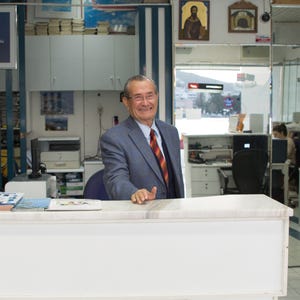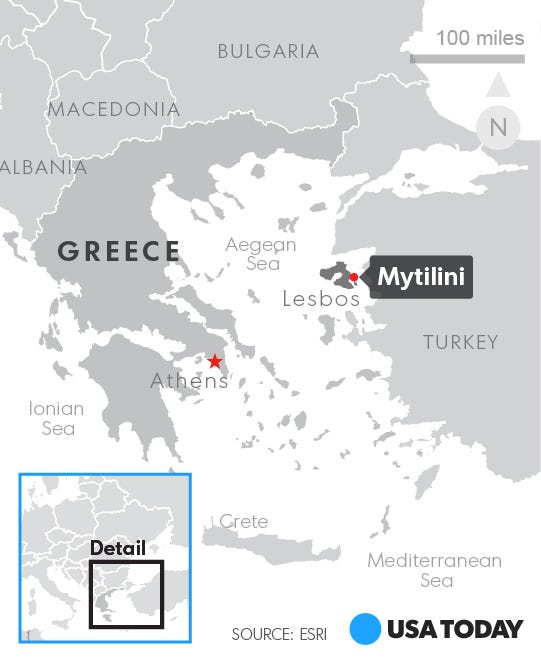The migrants are being sent to Turkey as part of a controversial plan to curb the flow of refugees.
USA TODAY
Turkey announced that three boats carrying a total of 202 migrants landed in this western port city. They were put on buses and whisked to an unknown location, possibly to a refugee camp near the Bulgarian border or the town of Duzici near the Syrian border.
Merve Demirkan, a spokeswoman for the Turkish foreign ministry, said she was not authorized to reveal information about their destination.
Most of the migrants were non-Syrians, such as Pakistanis and Bangladeshis, according to the Turkish newspaper, Hurriyet. At the same time, 16 Syrian refugees from Turkey arrived by plane in Hanover, Germany, according to the German press agency, DPA.
That is in keeping with the EU-Turkey agreement, which stipulates that the EU will take in one legitimate asylum seeker from war-torn Syria currently in Turkey for each Syrian returned to Turkey. The political bloc does not consider asylum applications from people who want to settle in Europe for purely economic reasons to be legitimate.
The agreement will see the EU pay an additional $3 billion to Turkey for hosting refugees. An estimated 2.7 million Syrians fleeing their country's civil war are currently in neighboring Turkey, which has said it lacks resources to manage that many without EU aid.
Monday's operation started hours earlier than initially announced to avoid protesters. Before dawn, six buses entered the Moria detention center on Lesbos and loaded people to be deported — one policeman from Frontex, the European border agency, for every deportee.
A small group of people arrived to protest the EU-Turkey deal. "Turkey is not a safe country," said Natasha Tsangarides, one of the activists who came to the port. "They've already done deportations back to Afghanistan, and there were also reports of them even not letting Syrians back in."
About 2,900 migrants are currently detained on Lesbos, a short ferry ride from Turkey, and more than 2,700 have said they would apply for asylum. That means they cannot be deported until they have a hearing, a process that could take weeks.
Human rights groups have been critical of the EU-Turkey plan, saying Turkey cannot adequately care for them. "This is the first day of a very difficult time," Giorgos Kosmopoulos, the head of Amnesty International in Greece, told the Associated Press. "The EU is forging ahead with a dangerous deal."
More than 1 million people migrated to Europe last year, prompting a public backlash over concerns about security and strains on domestic resources. Those complaints led to the new agreement for handling the flow of migrants.
A total of 50,000 migrants are stranded in Greece, a convenient gateway to Europe, after several EU and Balkan countries closed their borders and blocked the migrants from traveling west and north. Only those who arrived in Greece after March 20 will be detained for deportation.
Manolis Chatzichalkias, who represents refugees in the detention camp detailed how one of his clients, a member of the oppressed Ajlaf Muslim minority in Pakistan, has not been told of his legal options.
“People inside the camp are given a paper that tells them their rights as detainees, but doesn't inform them of their right to apply for asylum,” said Chatzichalkias. “Pakistanis are definitely being misinformed on their right to claim asylum.” Chatzichalkias was told they either didn't have the right to apply for an asylum or that their applications would be turned down, because they are considered economic migrants, not people fleeing for personal safety.
The vetting process could take a long time since there currently are only eight workers handling asylum claims. Although the EU has promised to send people who specialize in asylum applications, only officers from Frontex and French riot police have arrived so far to keep migrant crowds orderly.
For the migrants trapped in Greece, frustration is rising. In the Lesbos town of Mytilini, an old military camp in an olive grove has been turned into the Moria detention center, where 2,900 migrants are being held in crowded conditions behind a barbed-wire fence. Even though the number of new arrivals has dropped from 1,000 to 300 a day, there still isn't enough space to put them all.
At the Moria camp, children play in the dirt and the gravel, while dozens of people form a long line under the hot sun to get their food. Shouting is constant as people jump the lines while others complain about the small portions. At night, dozens of people sleep in the open because there are not enough places in the tents and shelters for everyone to find a bed.
The United Nations and Doctors Without Borders have both warned that conditions in the Moria camp are deteriorating.
Still, the migrants keep coming. On a recent morning, a Greek coast guard vessel docking in Lesbos brought more than 150 people intercepted trying to cross from Turkey. Syrians, Afghans, Iraqis, Eritreans and a few Pakistanis were among those rescued.
A Syrian refugee, Selout Essa, 17, stepped off the vessel and asked, "Are we going to be arrested by the Greek police?"
Essa was taken on a police bus to the Moria detention center with her family and is still waiting. She doesn't know if she'll ever get to Germany, the family's destination.
“I want to go to Germany to be safe,” said Essa. “My mother is sick. Her blood pressure is very high and she needs medicine. You know, we can't find her medicine in Syria. We are afraid to be sent back to Turkey.”
Apostolou reported from Mytilini, Greece, and Kotsev from Istanbul. Contributing: Will Cummings and Kim Hjelmgaard.


No comments:
Post a Comment